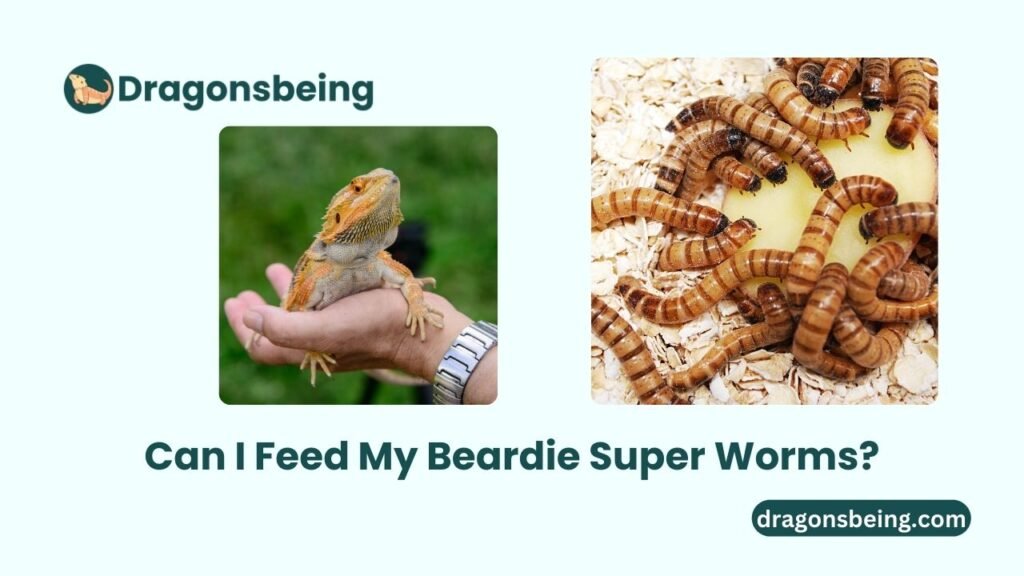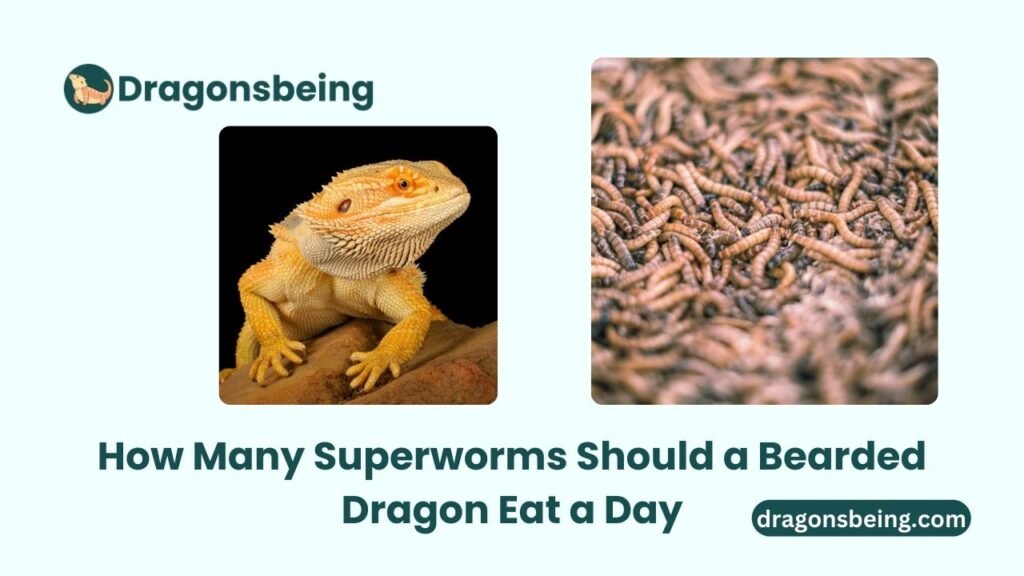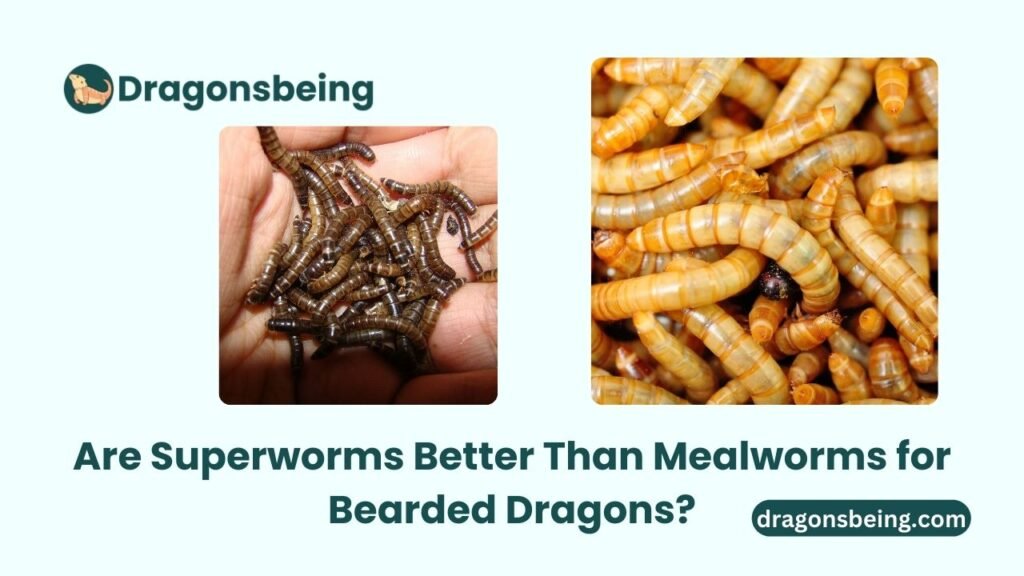Yes, you can feed your bearded dragon superworms. They are a suitable treat but should be given in moderation.
Bearded dragons thrive on a varied diet that includes insects, vegetables, and fruits. Superworms are high in protein and fat, making them a nutritious option.
However, they should not be the primary food source. Too many super worms can lead to obesity and health issues.
It’s essential to balance their diet with other insects and greens. Always ensure that the super worms are appropriately sized for your beardie.
Young dragons require more protein, while adults need more fiber. Offering a diverse diet promotes overall health and well-being in your bearded dragon, keeping them active and vibrant.
What Are Super Worms?
Superworms are a popular feeder insect for reptiles. They belong to the darkling beetle family. Many reptile owners use them as a nutritious food source. These worms are larger than mealworms and have a high-fat content.
Super Worms Profile
- Scientific Name: Zophobas morio
- Size: 2 to 4 inches long
- Color: Yellowish-brown
- Life Cycle: Larva stage of the darkling beetle
Superworms are easy to breed at home. They thrive in warm, moist conditions. They are often sold in pet stores or online.
Nutritional Content
| Nutrient | Amount (per 100g) |
|---|---|
| Protein | 20-25g |
| Fat | 13-20g |
| Fiber | 5-7g |
| Calcium | 0.02g |
| Phosphorus | 0.15g |
Superworms provide essential nutrients. They are a good source of protein. The fat content is higher than other feeders.
- Supports growth and development.
- Provides energy for active reptiles.
- Can be used as a treat.
Monitor your bearded dragon’s diet. Too many super worms can lead to obesity. Balance their diet with vegetables and other insects.
Benefits Of Super Worms For Beardies
Super worms offer many advantages for bearded dragons. They can be a tasty treat. Let’s explore their benefits in detail.
High Fat Content
Super worms have a high fat content. This can be good for beardies, especially young ones. Healthy fats help in growth and energy. Use them in moderation to avoid obesity.
| Super Worms Nutritional Value | Per 100g |
|---|---|
| Fat | 20g |
| Protein | 25g |
Protein Source
Super worms are a great protein source. Protein supports muscle development and overall health. A diet rich in protein helps beardies stay active.
- Supports muscle growth
- Enhances energy levels
- Improves skin health
Feeding Stimulation
Super worms provide feeding stimulation. Beardies enjoy chasing and catching them. This behavior mimics their natural hunting instincts.
Feeding stimulation is important for mental health. It keeps your beardie engaged and active.
- Encourages exercise
- Reduces boredom
- Promotes natural behavior
Risks Associated With Super Worms
Feeding super worms to your beardie can be risky. It’s important to understand these risks. Super worms can pose several dangers to your pet’s health. Below are the main concerns you should consider.
Choking Hazards
Super worms are larger than other feeder insects. Their size can lead to choking.
- Bearded dragons may struggle to swallow them.
- Choking can cause serious health issues.
Always monitor your beardie while eating. Cut super worms into smaller pieces if needed.
Overfeeding Issues
Super worms are high in fat. This can lead to obesity in your beardie.
Signs of overfeeding include:
- Weight gain
- Lethargy
- Reduced activity
Limit super worms to occasional treats. A varied diet is crucial for health.
Nutritional Imbalances
Super worms lack essential nutrients. Relying too much on them can harm your beardie.
| Nutrient | Super Worms | Recommended Sources |
|---|---|---|
| Calcium | Low | Collard greens, kale |
| Protein | Moderate | Crickets, mealworms |
| Vitamins | Low | Vegetables, fruits |
A balanced diet ensures your beardie stays healthy. Offer a variety of insects and vegetables.
Proper Feeding Techniques
Feeding your bearded dragon properly is crucial for their health. Superworms can be a nutritious option, but you must use proper techniques.
Sizing The Worms
Choosing the right size of super worms is essential. Large worms can be difficult for your beardie to eat. Follow these guidelines:
- Choose worms that are no longer than the width of your beardie’s head.
- Avoid worms that are too small, as they may not provide enough nutrition.
Correct sizing helps prevent choking and ensures easy digestion. Monitor your beardie’s eating habits closely.
Frequency Of Feeding
Feeding frequency plays a significant role in your beardie’s diet. Young beardies need more food than adults. Here’s a simple feeding schedule:
| Age Group | Feeding Frequency |
|---|---|
| Hatchlings (0-3 months) | Daily, 10-15 worms |
| Juveniles (3-12 months) | Every other day, 5-10 worms |
| Adults (1 year and older) | 2-3 times a week, 3-5 worms |
Adjust the feeding frequency based on your beardie’s activity levels and health.
Supplementing The Diet
Super worms should not be the only food in your beardie’s diet. Use a variety of foods for balanced nutrition. Recommended supplements include:
- Leafy greens (kale, collard greens)
- Vegetables (carrots, bell peppers)
- Fruits (strawberries, blueberries) in moderation
Offer calcium and vitamin supplements as needed. This ensures your beardie stays healthy and active.
Preparing Super Worms For Feeding
Feeding super worms to your beardie can be beneficial. Proper preparation is key. This ensures your pet receives maximum nutrition. Follow these steps to prepare superworms safely and effectively.
Gut Loading
Gut-loading super worms boosts their nutritional value. This process involves feeding the worms nutritious foods.
- Fresh fruits like carrots and apples.
- Vegetables such as leafy greens and squash.
- Commercial gut loading diets are also effective.
Gut loading should happen at least 24 hours before feeding. This maximizes vitamins and minerals in the worms.
Dusting With Vitamins
Dusting super worms with vitamins enhances their health benefits. Use a high-quality calcium and vitamin powder.
Follow these steps:
- Place super worms in a container.
- Add a small amount of vitamin powder.
- Shake gently until worms are coated.
Dusting should occur right before feeding. This ensures your beardie gets the most nutrients.
Safe Storage
Proper storage of superworms is crucial. Keep them alive and healthy for feeding. Follow these guidelines:
| Storage Method | Details |
|---|---|
| Temperature | Keep them at 70-80°F (21-27°C). |
| Container | Use a ventilated container with bedding. |
| Food | Provide fresh fruits and vegetables for sustenance. |
Check the worms regularly. Remove any dead ones to maintain health.
Alternatives To Super Worms
Feeding your bearded dragon a varied diet is crucial. Super worms are popular but not the only option. Explore other insects, vegetables, and commercial diets.
Other Insect Options
Many insects are safe and nutritious for bearded dragons. Here are some great alternatives:
- Crickets: High in protein, low in fat.
- Mealworms: Easy to find, but use sparingly.
- Roaches: Packed with nutrients and very active.
- Waxworms: Treats high in fat, use occasionally.
| Insect | Protein Content | Fat Content |
|---|---|---|
| Crickets | 20% | 10% |
| Mealworms | 15% | 20% |
| Roaches | 25% | 10% |
| Waxworms | 15% | 40% |
Vegetables And Fruits
Fresh vegetables and fruits add variety to your bearded dragon’s diet. They provide essential vitamins and minerals.
- Collard greens: Rich in calcium.
- Mustard greens: Great for hydration.
- Bell peppers: High in vitamin C.
- Carrots: Good source of beta-carotene.
- Blueberries: Antioxidants and tasty!
Chop these foods into small pieces. Ensure they are fresh and pesticide-free.
Commercial Diets
Commercial diets can be convenient and balanced. Many brands cater to bearded dragons.
- Pellets: Formulated with nutrients.
- Freeze-dried insects: Easy to store and feed.
- Powdered diets: Can be mixed with water for a paste.
Check labels for quality ingredients. Choose options without fillers or artificial additives.
Monitoring Your Beardie’s Health
Keeping a close eye on your beardie’s health is essential. Proper nutrition impacts their overall well-being. Super worms can be a part of their diet. Understanding how to monitor their health helps ensure they thrive.
Signs Of A Balanced Diet
A balanced diet keeps your beardie active and healthy. Look for these signs:
- Shiny, vibrant skin: Healthy skin indicates good nutrition.
- Regular shedding: Normal shedding means they are growing.
- Active behavior: An active beardie is usually healthy.
- Healthy weight: Weight should be stable, not too high or low.
- Normal bowel movements: Consistent and formed droppings are key.
When To Consult A Vet
Consult a vet if you notice any changes. Seek professional help for these signs:
- Lethargy: If your beardie is less active.
- Loss of appetite: Not eating for more than a day.
- Abnormal droppings: Watery or runny stools.
- Weight loss: Sudden drops in weight.
- Signs of illness: Any unusual behavior or symptoms.
Regular Health Check-ups
Regular health check-ups are vital for your beardie. Schedule visits with a vet that specializes in reptiles. During check-ups, the vet will:
- Examine skin and scales.
- Check weight and hydration levels.
- Assess diet and feeding habits.
- Look for signs of parasites.
Routine check-ups help catch problems early. Keeping your beardie healthy leads to a happy life.
Frequently Asked Questions
Can Super Worms Be A Staple Diet For Beardies?
Super worms should not be the primary food. They lack essential nutrients needed for a balanced diet.
How Often Can I Feed Super Worms?
Feed super worms as an occasional treat, not more than once a week, to maintain a balanced diet.
Do Super Worms Provide Enough Protein?
Super worms do offer protein but are low in calcium, making them unsuitable as a sole protein source.
Are Super Worms Safe For Baby Bearded Dragons?
Baby Bearded Dragons should avoid super worms due to their size and potential choking hazard.
What Are The Benefits Of Feeding Super Worms?
Super worms can stimulate hunting behavior and provide variety in your Beardie’s diet, enhancing their overall well-being.
Can Super Worms Be Gut-loaded?
Yes, super worms can be gut-loaded with nutritious foods before feeding them to your Beardie for added benefits.
Conclusion
Feeding your Bearded Dragon super worms can be a nutritious option. They offer essential protein and can be a tasty treat. Always balance their diet with vegetables and other insects. Monitor your pet’s health and adjust their diet as needed.
A varied diet keeps your beardie happy and thriving.

Hi, I’m Dr. Michelle Mayers, a veterinary professional with a deep passion for animal health and well-being. Over the years, I’ve dedicated my life to caring for animals and helping pet owners better understand their furry, feathered, or scaly companions. On my blog, Dragonsbeing, I share insights, tips, and stories that aim to educate, inspire, and connect with fellow animal lovers. Join me at Dragonsbeing as we explore the fascinating world of veterinary care and celebrate the special bond between humans and animals!


